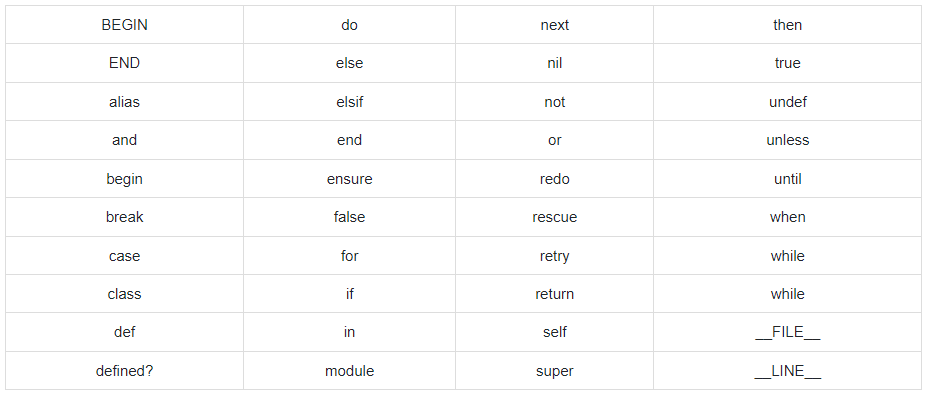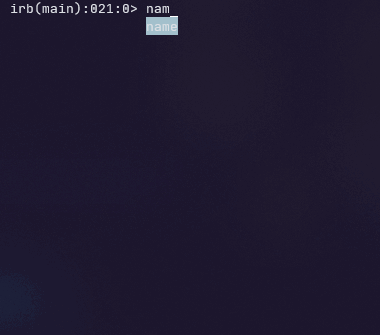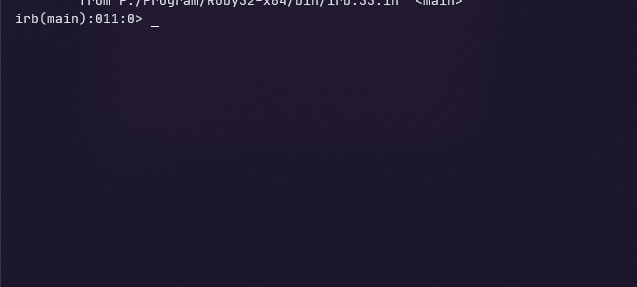Ruby is an open source programming language with a focus on simplicity and productivity.
Here are some main features of Ruby :
- Ruby is open-source and is freely available on the Web, but it is subject to a license
- Ruby is a server-side scripting language similar to Python and PERL
- Ruby is very much scalable
- Big programs written in Ruby are easily maintainable
- Ruby can be used for developing Internet and intranet applications
- Ruby can be embedded into Hypertext Markup Language (HTML)
You'll find here some examples of using Ruby for my personnal use and test.
Hope it can help :)
-
Test files :
-
Useful resources :
-
OS
- Kali Linux OS - Ruby v3.1.2
- Windows OS - Ruby v3.2.2
-
IDE
- VSCodium v1.77.1
├── Makefile
├── README.md
└── src
├── examples
| ├── example_1.rb
| ├── example_2.rb
| ├── example_3.rb
| ├── example_4.rb
| ├── example_5.rb
| ├── example_6.rb
| ├── example_7.rb
| ├── example_8.rb
| └── example_9.rb
| ├── example_10.rb
| ├── example_11.rb
| ├── example_12.rb
| ├── example_13.rb
| ├── example_14.rb
├── ask-question.rb
├── tips.rb
└── tuto.rbConsidering you already have Ruby on your host machine, you can use make to read any file inside this repo
make run FILE=[name of file]tuto.rb is a simple ruby tutorial
ask-question.rb use the method gets and chomp
When you enter your word, you'll see that your sentence is broken down into two lines and chomp can remove "\n" from the answer.
Launch an example :
make run_example FILE=example_1- example_1: convert the answer from string to number and test if the number is even, conditions
- example_2: Guess the number, comparison
- example_3: Is the word a palindrom ?
- example_4: array
- example_5: Hash and Hash class
- example_6: Symbols
- example_7: Loop, guess again the number WHILE loop
- example_8: Loop, guess again the number FOR loop, each for arrays and hash
- example_9: Loop, iterator LOOP BREAK
- example_10: Frequency of a word
- example_11: Methods
- example_12: Block & proc
- example_13: Deep dive into proc
- example_14: Lambda
- Antoher way to create an array of string
%w{apple pear fig} => ["apple", "pear", "fig"] # shortcut-
respond_to?(:method_name) => let you check if the value given can be used for the method, give a boolean value
-
convert array of mixed number int and string into array of integer:
array = [1, "2", 3, "4", 5]
puts array.inspect
# Solution 1
array_1 = array.map { |i| i.to_i }
puts array_1.inspect
# Solution 2
array_2 = array.map(&:to_i)
puts array_2.inspectThe following list shows the reserved words in Ruby. These words may not be used as constant or variable names.
Single line comment:
# This is a commentBlock comment
=begin
This is a comment
And another line
And another comment
=endCreate method
def method_name
code
end
#with parameters
def method_name(params)
code
endVariables
varname = "Hello"Conditions
&& # AND
|| # OR
! # reverse everything afterConventions
method? # the ? gives a boolean
varname! # the ! indicate that value is modifiedConvert
to_i # convert to integer
to_s # convert to stringInsert value
# same result
"Hello" + "World" => "Hello" << "World"Block
def demo_1
puts "Hello"
yield # add the block "How are you?"
puts "Bye bye"
end
demo_1 { puts "How are you?" } # you have to add a block with yield keywordError in case you didn't add block:
Proc
proc_name = Proc.new { ...code }
method_name(other_params, &proc_name)
# the & is for casting the new proc into block
proc_name.call(give_args) # reuse proc registered
lambda { } # a special proc and wait for a specific number of argument# turn the block into proc
def method_name(params, &proc_name)
...code
proc_name.call(give_args)
end
method_name(args) {...block_turn_into_proc}




